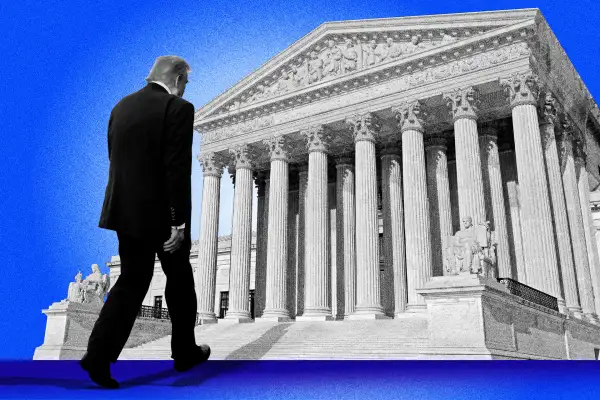What's Next for Trump's Tariffs After Supreme Court Oral Arguments

The U.S. Supreme Court heard highly anticipated oral arguments Wednesday in the legal challenge to President Donald Trump's tariffs. It's a case the president is calling a "life or death" moment for the nation.
The Trump administration wants permission to maintain tariffs ranging between 10% to 50% on dozens of countries. The president's lawyers are seeking a reversal of an appeals court opinion that said the White House lacks the authority for Trump's sweeping tariff program.
Attorneys for the two sides argued their cases before the nine Supreme Court justices for well over two hours Wednesday morning, debating doctrines, precedent and statute interpretations that could determine the fate of tariffs.
When Justices Amy Coney Barrett and Neil Gorsuch pressed the attorney representing the Trump administration with hard questions, some analysts leapt to say it was looking bleak for Trump, who decided not to attend the hearing after teasing earlier that he would go. But later, lawyers for the plaintiffs faced tough questions of their own about whether tariffs are an authorized exercise of the president's regulatory power.
It remains unclear how at least a few of the justices on the court, which has a conservative majority, are leaning.
For consumers, the consolidation of Learning Resources v. Trump and Trump v. V.O.S. Selections could be one of the most consequential economic cases that's gone to the Supreme Court in recent history, with the potential to affect everything from prices at the grocery store to mortgage rates and the labor market. Trump's tariffs are intended to boost American manufacturing, but they risk causing more inflation. Tariffs also remain deeply controversial.
Trump said winning the tariff case will cement "financial and national security," citing trade deals that he's negotiating with countries "who have, for years, taken advantage of us," as he wrote in a Truth Social post Tuesday evening. However, economists who advocate for free trade say that tariffs stunt economic growth and result in higher prices for consumers.
Summary of the SCOTUS oral arguments in Trump tariff case
Democrat-led states and businesses filed lawsuits back in April challenging most — but not all — of Trump's tariffs, ultimately leading to Wednesday's oral arguments.
The Trump administration, represented by Solicitor General D. John Sauer, argued that the International Emergency Economic Powers Act, or IEEPA, gives the president the power to impose his tariffs. Prior to his announcements on "Liberation Day," Sauer said, Trump had determined that "exploding trade deficits had brought us to the brink of an economic and national security catastrophe." That was in addition to the drug trafficking of opioids, which constituted as a second emergency.
"These emergencies are country-killing and not sustainable," Sauer said.
Neal Katyal, one of the attorneys representing small businesses, argued the president has no emergency authority to impose tariffs on dozens of trading partners. He noted that Trump levied a 39% tariff on Switzerland, an ally with which the U.S. actually runs a trade surplus.
"Tariffs are taxes," Katyal argued before the justices. "They take dollars from Americans' pockets and deposit them in the U.S. Treasury."
Are tariffs a 'tax' on American consumers?
Sauer contended that Trump's tariffs are regulation of foreign commerce, not a tax. This is a crucial question in the case because, constitutionally, the power to tax lies with Congress.
But Justice Elena Kagan, appointed to the court by Barack Obama, pushed back on Sauer's line of reasoning: "You want to say tariffs are not taxes, but that's exactly what they are. They're generating money from American citizens — revenue," she said.
Barrett, who was appointed by Trump in 2020, appeared skeptical at times of the solicitor general's argument that the power to "regulate" imports in the text of IEEPA includes the power to tariff.
"Can you point to any other... time in history where that phrase together 'regulate importation' has been used to confer tariff-imposing authority?" she asked.
Chief Justice John Roberts, a George W. Bush appointee, also noted that IEEPA had "never before been used to justify tariffs," adding that "no one has argued that it does until this particular case."
In the background, many consumers remain worried that tariffs will function as tax in the form of higher inflation. Prices have been rising rapidly, with inflation reaching 3% in September. Goldman Sachs and Bank of America estimate that tariffs have already added about half a percentage point to annual core inflation.
When will the Supreme Court rule on tariffs?
With oral arguments done, the court could issue its opinion at any time between now and the end of its term in June or July.
The Supreme Court granted the administration's request for "expedited" review; however, that doesn't come with a set deadline. The administration is requesting a quick turnaround because a longer delay increases "economic disruption," according to a declaration by Treasury Secretary Scott Bessent.
Tariffs will remain in effect for now. On Truth Social, Trump said the country would be "virtually defenseless" against other nations in terms of trade if the Supreme Court strikes them down.
However, this Supreme Court case will not mark the end of tariffs entirely, no matter the outcome. The administration says it has a plan B for justifying more limited tariffs on other grounds. In recent weeks, Trump has also added more sector-specific tariffs, which are less vulnerable to legal challenges. And existing tariffs on steel, aluminum and automobiles do not rely on the IEEPA and are unaffected by this case.
More from Money:
Will the Supreme Court Stop Trump's Tariffs? Experts Weigh In
Should You Invest Your 401(k) in Private Equity?
Retirees Are 'Terrified' Tariffs Will Cancel Out the Social Security COLA

